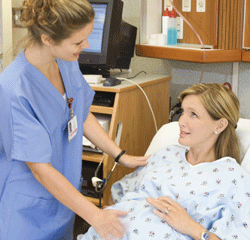1. Thank you for educating me to know the symptoms and how dangerous preeclampsia can be.
Because you have seen firsthand the impact of preeclampsia you can coach patients to be proactive about recognizing symptoms and reporting them to their pregnancy provider. At the Preeclampsia Foundation, we have a motto we share with pregnant women: “Know the symptoms. Trust yourself.” By this we mean that each pregnant woman should be empowered to speak up and rapidly seek a medical evaluation if any of the signs and symptoms of preeclampsia occur.
We know nurses have busy, demanding jobs so we appreciate even more when nurses listen carefully to our symptoms.
Outcomes are improved and risks minimized when nurses promptly track test results and stay in close communication with women and other health care providers. We also appreciate you paying attention to small details such as, taking our blood pressure in the right position with the right size cuff and not retaking our blood pressure to try to get a lower reading. Preeclampsia is a complex disorder and, as you know, details matter.
With or without perinatal loss, there is often great emotional strain on the patient and family. Different family members may be feeling different emotions from one another (e.g., fear, sadness, anger, relief, emptiness, joy) or be focusing on conflicting factors (i.e., mom vs. baby). Patients do appreciate the care you give them, but they may not be in the best frame of mind to make that clear to you.
Your ability to show compassion and be patient with our needs is greatly appreciated.
Even though some women can be very demanding and “high maintenance,” showing empathy goes a long way because women with complicated pregnancies have additional physical and emotional traumas. We are often in severe pain, feel horrible from magnesium sulfate, and usually in shock and emotional pain over any bad outcomes during childbirth.
Even without longer term PTSD, there will likely be short-term emotional pain that is different from postpartum depression. And the dads are not immune, although they may look stronger in the short term. Even without a formal screening process, nurses are an important first line of defense to help patients and their families be aware of the impact preeclampsia may be having.
There are many opportunities to share critical aspects of the woman’s condition with other team members, especially during shift changes. When postpartum women are transferred to another unit, the original labor and delivery nurses play an important role in the transition by sharing sensitive emotional care information to other staff.
We appreciate being told information about our condition in a compassionate and caring way. It is empowering to be told the truth rather told not worry when something is wrong or giving us false reassurance.
9. Thank you for helping us and our families cope with loss or having a baby in the neonatal intensive care unit (NICU).
You help by alerting visitors and all health care staff that there has been a loss (for example, by hanging a small wreath on the door or the message that baby is in the NICU), and preventing inappropriate comments and questions. Your sensitivity to what patients may overhear from nearby happy-outcome families is also noted
We appreciate it when you avoid making suggestions about what might have happened if only we had eaten more/less/different food, exercised more/less, weighed more/less, or come to the hospital sooner.






Comments are closed.